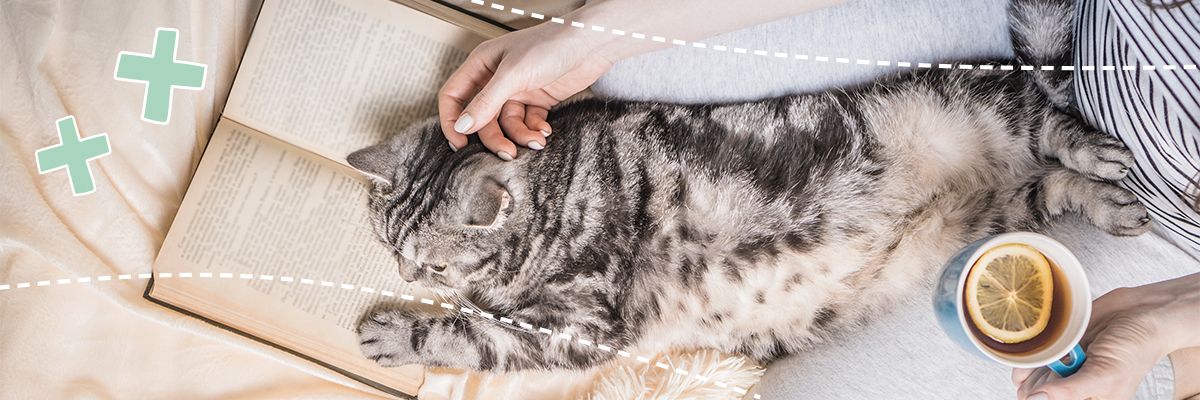
SUMMARY
- The burden of caring for a sick cat is equal to the burden of caring for a family member
- Caring for a sick pet can lead to stress and negative emotions
- There are solutions to reduce the psychological burden
*Advertisement, as brand name mentioned
A chronic kidney diseased cat demands a lot from its owner. Apart from additional financial expenses due to more frequent visits to the vet, medication and other means, the time and especially the psychological strain on the cat owner is sometimes immense. Feelings of guilt towards the beloved cat, to see her suffer, not being able to help her or not being able to afford a complex treatment, are often paired with the noticeable fear of losing the cat soon.
People deal with such stressful situations very differently. While some cat owners have a growing desire to become active, to inform themselves extensively and to better cope with the illness, there are also owners who deny the facts as long as possible. Both are so-called coping strategies, which are supposed to help to ease the negative emotions and stress for the cat owner.
The burden of CHRONICALLY ILL PETS
Pet owners who take care of a sick cat or dog are often exposed to stresses and strains, such as those resulting from caring for a sick relative – similar to caring for a human family member. A study by Britton et al (2018) has addressed this issue. The researchers found that caring for a chronically ill pet can be associated with particular burdens for the owner. The symptoms and behavioural changes of a sick pet can also have a negative impact on the emotions of the pet owner. The behavioural change of an otherwise cuddly cat, which is now retiring due to CKD, but also other personality changes such as unwillingness to play can, in addition to physical weakness of the cat, be perceived as very stressful by the owner. Christiansen et al. (2013) showed that changes in the human-dog relationship and joint activities in chronically ill or old dogs cause sadness and frustration in the owner, which can lead to feelings of guilt in the dog owner. Concerns about the progression of the dog’s condition, his well-being and consideration of possible euthanasia also create emotional distress for the dog owner.
TIME PRESSURE AND FINANCIAL RESTRICTIONS LEAD TO STRESS
Furthermore, the burdens include not only the high expenditure of time and money, but also feelings of guilt towards the animal and fear about the outcome of the disease. The pet owner feels guilty because he believes that he is not giving enough care to his beloved family member. These feelings of guilt can arise from time pressure or financial reasons. Time pressure leads pet owners to feel that their care is not at an appropriate level. This is often due to the fact that caring for a chronically ill pet is very time-consuming and comes on top of all other obligations of the pet owner such as work and family. This can lead to a “breaking test” between the care of the needy pet and all other obligations, so that the pet owner has the feeling that he cannot do justice to everything. This can also lead to negative emotions such as anger towards the fosterling, as the owner has to cut back because he now has less time for himself and/or the treatment costs a considerable amount. This shows that the burden for the pet owner can be connected with very opposite emotions, which can also lead to stress symptoms for the caring pet owner.
CARING PAYS OFF
On the other hand, the above mentioned studies also show positive aspects for the pet owner who cares for his fosterling, friend and family member: Pet owners report that they feel useful and appreciated, that they become more self-confident and show personal growth by caring for their chronically ill pet. The feelings of competence, of relationship growth and also the fulfilment of duties and roles can be beneficial for the pet owner.
The more the positive aspects are brought into the foreground, the less the pet owner feels the care of his sick pet as a burden. Pet owners constantly take care of their pet, look after and nurse it and this is an important aspect of their joy in keeping animals. This joy can be additionally promoted in the context of the care of a chronically ill animal. Here it is mainly about the perception of the animal owner, which can have a positive effect on him as well as on his sick animal and can promote the relationship between the two. This requires the positive assessment of care by the pet owner, which helps to reduce stress. Stress factors can include the pet owner’s perception that following new rules and routines for the treatment of the animal or due to the condition of the animal is a challenge for him. Christiansen et al. (2013) showed in their study that owners of old or chronically ill dogs deal with the changes and challenges in very different ways and that their own quality of life is therefore affected by this stress to varying degrees.

KEEPING CONTROL AND CLARITY
In order for the pet owner to feel less burdened by the care, practical measures to reduce the daily burden (stress reduction, planning) can be beneficial for him. The researchers also suggest targeted periods of rest and competence-based problem solutions to reduce the stress associated with pet care. The feeling of control of the pet owner plays an important role in this process. This feeling of control and competence can be achieved by dealing with the disease (obtaining information about the disease, therapy, etc.), but also by focusing on smaller measures that the pet owner can take himself. Every small step also leads in the right direction.
ONLY WHO CARES FOR HIMSELF, CAN ALSO CARE FOR HIS PET
This also includes dealing with oneself. Because only those who take care of themselves can also support their sick family member and make the best of the time with their beloved pet. If you decide to care for a chronically ill animal instead of euthanising it, you accept the burdens and stress that caring for the sick pet entails. This is a conscious decision that the pet owner makes and can therefore have a positive effect on his or her perception of stress.
However, the stress associated with caring for a chronically ill animal can be twice as high as the stress associated with caring for a healthy pet. This can affect the mental health of the pet owner and lead to depression. These mental changes can also affect the physical well-being of the pet owner, as daily stress contributes to health problems: reduced attention and higher levels of the stress hormone cortisol are found in such care-stressed pet owners and can negatively affect their own quality of life. Pet owners often care for their beloved pet until it is no longer possible and their own physical, mental, social or financial burdens become too severe for them. It should not come so far.
WHAT CAN You LEARN FROM THIS AS A CAT OWNER?
As with many solutions to problems, small steps can help. Everyone can start by informing themselves about the disease, diagnostics and therapy. This can sometimes be tedious, time-consuming and very frustrating. At least that’s how I experienced it and that’s the reason why I wrote this website for cat owners of cats with chronic kidney disease, which should make this step easier. It contains the most important information that I would have liked to have had at that time. I also deepen the information in the blog posts. By building up knowledge I had the feeling of control which helped me to accompany my cat through the CKD and also to enjoy the beautiful moments. In addition, I got a realistic view of our present situation together, which also helped me to better sort and plan my life.
(More about our path with Chronic Renal Failure)
A further step is to provide relief. For example, animal-loving friends can help with the care of the sick pet, so that the burdened pet owner can also take some time out. It makes you wonder who is ready to do so. At least it was like that with me and I can only recommend to actively address friends.
In the end it is really important to take care of yourself. Especially with chronically ill animals, the illness phase often lasts for several years. The additional care of the beloved pet is an additional burden that you have to accommodate in your everyday life. Nevertheless, life must continue and remain worth living, so that the animal owner is able to cope with this care task and do justice to his sick animal.
*As this article contains named active substances, I am marking this article as an advertisement
Bibliography:
- Britton, K. / Galiato, R. / Tremont, G. / Chapman, K. / Hogue, O. / Carlson, M. D. / Spitznagel, M. B. (2018): Caregiving for a Companion Animal compared to a Family Member: Burden and Positive Experiences in Caregivers. In: Frontiers in Veterinary Science, Vol. 5, Article 325.
- Christiansen, St. B. / Kristensen, A. T. / Sandøe, P. / Lassen, J. (2013): Looking After Chronically III Dogs: Impacts on the Caregiver’s Life. In: Anthrozoös, 26(4), S. 519–533.
- Spitznagel M. B. / Ben-Porath, Y. S. / Rishniw, M. / Kogan, L. R. / Carlson, M. D. (2019): Development and validation of a Burden Transfer Inventory for predicting veterinarian stress related to client behavior. In: Journal of the American Veterinary Medical Association 254(1), S. 133–144.
- https://www.petcaregiverburden.com/


